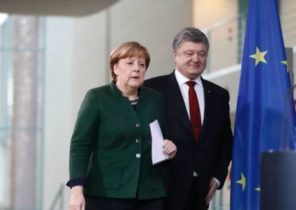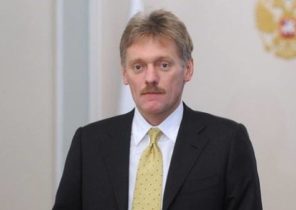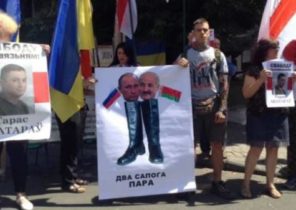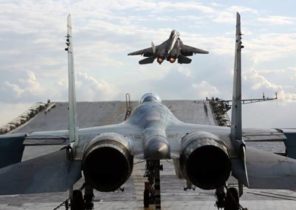
Former Deputy commander of NATO forces said the scenario of a fictitious war with Russia and fears that within five years the transatlantic Alliance will cease to exist.
After retiring from his post as the second-highest military position of NATO, General sir Richard Shirreff has created an interesting war game — a 500-page book about a fictional war with Russia, received the name “War with Russia”. The book is built in the style of warnings against repeating the policy of appeasement in the period before the Second world war, and is expressed in the literary form warning of the dangers of the Western concessions, coupled with the romance, about the Russian President with “a pale, bloodless face” (known only as Vladimir Putin) and about a group of awkward, selfish ambassadors of NATO countries are not able to quickly agree on the necessary actions.
The plot seems mostly contrived, but some key moments to the horror resemble real-world geopolitical events, observed in recent years, for example, Russia’s use of disinformation to provoke public sentiment and to justify military action. The main story begins with the Russian invasion of Ukraine followed by the invasion of Latvia, Lithuania and Estonia. Every time NATO discusses response and each time response is insufficient to deter escalation. In the end, the war begins.
Shirreff published his book in may, and since then, several geopolitical earthquake changed our view about the expected future. Some events have brought our real world to this fantasy, for example, a British exit from the European Union, as the General had predicted in the book, and the growing aggressiveness of Russia. And some of the events exceeded his predictions, for example, the Russian hacker attacks against the National Democratic party in trying to manipulate the American presidential election. Shirreff recognizes that it surpassed anything he could have imagined a year ago. He also did not imagine the victory of Donald trump, who are much less tuned in favor of NATO and is much more friendly to Putin than a serious woman with a hawkish stance, which became the US President in his book.
Taking into account changes in the world we felt that we should talk to Sheriffa about how a fictional universe, on which he worked has changed dramatically in just a few months. If the scenario seems bad enough, the victory of Donald trump have made it even less optimistic, and he believes that Russia has increased, and NATO may cease to exist within five years.
This interview was shortened and edited.
In the beginning of the book the new President of the United States is reviewing the approach of “hands-off” in relations with Russia, it supplies weapons to Ukraine and committed to decisively confront Russia. Donald trump is not at all like.
Richard Sherriff: No. This is the exact opposite Trump. (In the book) the American President is fully ready to lead NATO and to lead the free world.
What we saw against trump is that he, and justified in his case, is justified in the case of the United States, chastised the European members of NATO for failing to meet obligations on military spending, which has led them to dependence on America. But trump is not the first talking about it. The Ministers of defence and secretaries of state of the USA repeat this for several decades.
A much more frightening statement trump that he will not necessarily come to the aid of a NATO member under attack. This attack undermines the credibility of the collective security of NATO and the fifth article of the Charter of the organization, which States that an attack on one NATO member is an attack on all. It’s scary, because the entire defense of Europe since 1949, when NATO was created, was based on the belief that whoever was in the White house, the United States will come to the rescue of the assaulted member of NATO.
And he recently decided to appoint Tillerson received from Vladimir Putin the Order of Friendship. Obviously, this is not the man who is willing to confront Russia.
The whole principle of collective security and deterrence is the need to show decision-makers in the Kremlin that the risk is so high that trying to bite off a part of the territory of the Baltic States is not worth it.
But after the inauguration of the trump in January, Putin may decide that it’s worth it, because the USA can not come to the rescue of the Baltic countries that had been attacked. And he can get away with. This is the danger.
— If you look five years ahead, what will happen to NATO? The Alliance will outlive the presidency of trump?
— If on 21 January, the new President will clearly give to understand that the United States remains the leader of NATO and is fully aware of the importance of the fifth article of the Charter, and that the US under his leadership remain faithful to the principles of collective security and will come to the rescue of the assaulted member of NATO, the Alliance will survive the presidency of trump. NATO may even flourish under trump. But if, instead, it will continue to undermine the credibility of collective security, as he started to do during the election campaign, NATO in five years will disappear.
And how, in your opinion, would it look like? The end of NATO? The demonstration of aggression and the failure of NATO to come to the aid of the Baltic country, and then repeating this until because of the actions of Putin or someone else will become clear that NATO can not be taken seriously?
— NATO is an Alliance based on the principles of individual freedom, democracy and the rule of law. But this Alliance is based on trust. It is not a Union based on transnational agreements between members. The statement that an attack on one is an attack on all, very idealistic.
If the leader of NATO prefers a multinational approach and said he would come to the aid of the country, are willing to pay for the stay of American troops on its territory and all that, then this trust disappears. There are centrifugal forces which exceed the forces that bind the country together. I think that’s a problem, and lost confidence in NATO attacks on the Baltic States is not required.
— The willingness of the U.S. to military intervention plays a major role among the decisions taken by the government in the book. If you were writing the book now, when the President was trump, a possible Secretary of state was Rex Tillerson, how would that affect the situation?
— Vladimir Vladimirovichu it would be much, much easier to attack. As you know, it needs to be absolutely sure of impunity, that the US does not intervene, and he knows that NATO will not do anything if the US will not take on the role of leader.
Second, if the United States does not fulfill the fifth article of the NATO Charter on collective security and the security of Europe, the Alliance will collapse, because NATO should be confident in the reliability of the United States.
Thirdly, as you remember, although the book ends sadly, but in the end there is still optimism. But if the United States if trump does not intervene, any optimism will not. Would be a disaster.
No, I don’t want to say that the Russian troops on the orders of Putin will March in Paris. Not at all. But we will see, in the words of Putin, the new Yalta agreement in Europe. The enslavement of communism will not, but we will see the former Soviet republics, particularly the Baltic countries, caught in the zone of Russian influence, and I think that this will be followed by the collapse of NATO and the resurgence of nationalism. It is still preserved beneath the surface in Europe, and in such a situation nationalism will come out of the closet. So this age will complete uncertainty.
— Now in the US all say that Russian hackers hacked into the servers of the Democratic national Committee (DNK). What role the book plays in cyber operations? If you were writing today, he would have made them more powerful?
Yes. It changed my expectations. Know what scares? When I started writing the book early last, 2015, that described the painting, which many consider fantastic. But, given the ensuing events, this picture, I’m afraid will be too soft.
I guess it was safe to assume that cyber space will become part of the asymmetric hybrid war, which was in the Crimea. From the inside to weaken the other state so that it collapsed without having your formal military invasion?
But I was expecting that the target will be one of the Baltic countries. I could not imagine that the Russian military intelligence, no doubt, on the orders of Putin, will attempt to use cyber-operations to manipulate the presidential election in the United States. This is a blatant slap in the face. This extraordinary step for a state in so-called peacetime.
But we should remember that Russians do not consider it peaceful. Russian believe that they are at war. The Kremlin believes that in 2014 there is a war, and these are not my words. These are the words of Dmitry Trenin, head of Moscow Carnegie center, a very respected think tank. It is people close to the Russian regime, and he believes in it.
Another question — what should we do with all this? First, we need to take this seriously, not as a trump, who says he doesn’t believe in it, and which, as we have heard, says that these hackers might be Chinese. But I’d rather believe the CIA on this case. But we should act in cyber space. We need to compete in the information space. You cannot allow Russia to escape responsibility for an asymmetrical war, which it Willy-nilly waging against us and against our democratic institutions.
You need to be active in cyber space. It seems to me a demonstration of the extraordinary weakness of the lack of any protection from the United States in cyber space, no warnings for Russia. And the UK should do the same, since we both have more than enough opportunities to block Russian banking system within 24 hours as a warning – don’t raise us. If you screw up, then we break your nose.
Campaign of disinformation play in your book a big role. They described the seizure of the school in Donetsk, orchestrated by Russia as a pretext for military intervention. As recently changed your understanding of these ancient disinformation campaigns of Russia in the age of social media and not check the news, and what it says about our vulnerability?
— Like you said, it’s an old technique “masking”, but the media opportunities of the XXI century allows to use this technique is much wider.
I think over the last couple of years, it became clear how far the Russians are willing to go, sharpen your approach and complicating the technique.
What does that say about the West and NATO? Times are tough, but we have to find a way to stop the chaos, as has already happened. It is impossible to control, but you can find a way to reverse to our benefit, as well as Russia turned it to his advantage.
The book also describes the calculation of how to avoid nuclear war. Win the trump in the election changed your opinion about the possibility of nuclear war? According to some rumors, he asked his advisers, why don’t we use a nuclear weapon.
— Yes, changed, because when the White house is the President asking why the hell we don’t use nuclear weapons… I Want to say that the Chinese were right, calling it tortious interference with Taiwan childish. This infantile approach to the complex theory of deterrence and the lack of understanding of the principle of deterrence, and that to prevent war it is necessary to create greater military capabilities and to convince others that you are ready to use it. But having such a tool to unleash Armageddon, you also have tight control and seriously to realize the circumstances under which it can be used.
I think talking about why we don’t use them, we generated a lack of faith in our resolve. This demonstrates a lack of understanding, which in turn talking about your opponent or probable aggressor, might give him the idea about the possibility to go unpunished.
The case is still unpredictable, I think. I believe that the curb looks like — if you do this, then we’ll do that. It’s predictable. (If I understand the implications), they will not take such a step.
— Why did you consider it fiction the best way to communicate their concerns?
— General John Hackett wrote a book called “world war III”. It was written and published in the year 1977-1978, made a big impression on me. I have just finished University and entered military service.
I figured it was time for a new story-the prediction, as it was then. The reason were changes generated by the invasion of Crimea and Putin’s further actions. I thought it was very, very dangerous, and it’s time to take a pen and paper to write about a new Third world war.







